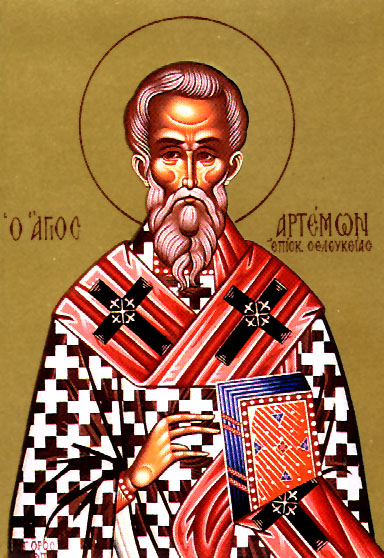

The Hieromartyr Artemon was born of Christian parents in Laodicea, Syria in the first half of the third century. From his youth, he dedicated himself to the service of the Church. The saint served the Church as a Reader for sixteen years. For his zeal in Church services, Artemon was ordained a deacon by Bishop Sisinius. St. Artemon also fulfilled this service with fervor and diligence for twenty-eight years, then he was ordained to the priesthood. In this position, St. Artemon served the Church of God for thirty-three years, preaching Christianity among pagans. When the emperor Diocletian (284-305) began his fierce persecution against Christians, St. Artemon was already old. The emperor issued an edict ordering Christians to offer sacrifice to idols. The hieromartyr Artemon, instructed by the voice of God, preached the Gospel in Asia Minor. Then an angel appeared to him and transported him to the place which has been revealed to him, where he converted many to Christ. Pagans seized the saint and beheaded him.
O holy priest-martyr Artemon, you lent yourself to the apostles’ way of life and succeeded them in their throne. Inspired by God, you found your way to contemplation through the practice of virtue. Therefore, you became a perfect teacher of truth, fighting for the faith unto the shedding of your blood. Intercede with Christ our God that He may save our souls.
You set out firmly with priestly devotion and completed the course in martyrdom. You passed into heaven, O wise Artemon and received laurels which will never fade. Now we come to celebrate your holy memory, crying out: As you stand before Christ, remember us, O martyr.
Philippians 4: 4-9
Brothers and sisters: Rejoice in the Lord always! I say it again. Rejoice! Everyone should see how unselfish you are. The Lord is near. Dismiss all anxiety from your minds. Present your needs to God in every form of prayer and in petitions full of gratitude. Then God’s own peace, which is beyond all understanding, will stand guard over your hearts and minds, in Christ Jesus.
Finally, my brothers and sisters, your thoughts should be wholly directed to all that is true, all that deserves respect, all that is honest, pure, admirable, decent, virtuous, or worthy of praise. Live according to what you have learned and accepted, what you have heard me say and seen me do. Then will the God of peace be with you.
John 12: 1-18
Six days before Passover Jesus came to Bethany, the village of Lazarus whom he had raised from the dead. There they gave him a banquet, at which Martha served. Lazarus was one of those at table with Jesus. Mary brought a pound of costly perfume made from genuine aromatic nard. With which she anointed the feet of Jesus. Then she dried his feet with her hair and the house was filled with the ointment’s fragrance. Judas Iscariot, one of his disciples (the one about to hand him over), protested: “Why was not this perfume sold? It could have brought three hundred silver pieces, and the money have been given to the poor.” (He did not say this out of concern for the poor, but because he was a thief. He held the purse, and used to help himself to what was deposited there.) To this Jesus replied: “Leave her alone. Let her keep it against the day they prepare me for burial. The poor you always have with you, but me you will not always have.”
The great crowd of Jews discovered Jesus was there and came out, not only because of Jesus but also to see Lazarus, whom Jesus had raised from the dead. The fact was, the chief priests planned to kill Lazarus too, because too many Jews were going over to Jesus and believing in him on account of Lazarus.
The next day the great crowd that had come for the feast heard that Jesus was to enter Jerusalem, so they got palm branches and came out to meet him. They kept shouting: “Hosanna! Blessed is he who comes in the name of the Lord! Blessed is the King of Israel!” Jesus found a donkey and mounted it, in accordance with Scripture: “Fear not, O daughter of Zion! Your king approaches you on a donkey’s colt.” (At first, the disciples did not understand all this, but after Jesus was glorified they recalled that the people had done to him precisely what had been written about him.)
The crowd that was present when Jesus called Lazarus out of the tomb and raised him from the dead kept testifying to it. The crowd came out to meet him because they heard he had performed this sign.
Icon courtesy of Jack Figel, Eastern Christian Publications – ecpubs.com
Saturday, April 12 –